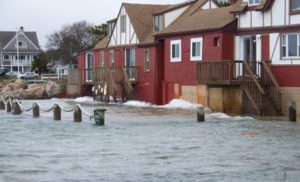
The vulnerability of coastal communities is gaining urgent attention in the face of climate change and devastating weather-related flooding and erosion. Clark University Professor of Economics Robert Johnston, director of the George Perkins Marsh Institute at Clark University, is leading vital research into the environmental and economic impacts of coastal hazards and adaptation along Northeast shores.
Johnston’s research assesses the economic benefits, costs and tradeoffs associated with coastal storms, flooding, and sea level rise in New England’s coastal communities. He has several projects under way, each supported by national grant-funding organizations, including the National Science Foundation (NSF), Sea Grant, and National Estuarine Research Reserve System (NERRS) Science Collaborative.
“Coastal vulnerability is an increasing focus of my work and that of the George Perkins Marsh Institute,” Johnston said. “These projects are all part of a broader research agenda to help communities better understand and adapt to hazards associated with coastal storms, flooding and sea level rise. Many decisions today are based on an incomplete understanding of the economics of coastal adaptation. We are trying to address this problem, and provide the information needed to make decisions that are in the long-term best interest of the public.”
Some of Johnston’s recent grant-funded projects include: “Coastal hazards and northeast housing values: comparative implications for climate change adaptation and community resilience” – Northeast Sea Grant Consortium ($175,000, 2014 to 2016)
The project combines data on coastal hazards, property value and other factors with economic models to answer three questions central to coastal adaptation in the U.S. Northeast: (1) How do property values and tax bases in Northeast communities respond to coastal hazards such as flood risk, and do these responses create incentives to build/rebuild in risk-prone areas or undertake private adaptations? (2) How do property values and tax bases respond to adaptation actions undertaken by states, municipalities or homeowners/developers? (3) What do results imply for future scenarios of property values and tax bases in Northeast communities, under alternative sea level risk and coastal hazard projections? Combined results will provide important information related to how coastal housing markets respond to the risk of coastal storms and flooding, and what this means for the results of different types of coastal hazard mitigation.

Working with Johnston on this project are Klaus Moeltner, Virginia Polytechnic Institute and State University, Christine Blinn, Virginia Polytechnic Institute and State University, and Christine Feurt, University of New England. The project is implemented in coordination with partners and communities involved in Northeast coastal adaptation including the Wells National Estuarine Research Reserve (NERR), Great Bay NERR, Waquoit Bay NERR, and Nature Conservancy in Connecticut.
“Coastal sustainability: a cross-site comparison of salt marsh persistence in response to sea-level rise and feedbacks from social adaptations” NSF ($1,996,971 collaborative grant, 2015 to 2019)
This multi-institutional, collaborative Coastal SEES (Science, Engineering and Education for Sustainability) project will study the dynamics of coastal wetland changes under different sea-level rise scenarios. Clark University will receive $377,776 of this larger grant to evaluate economic and social science aspects of these changes.
This interdisciplinary project leverages the long-term data, experiments and modeling tools at three different Atlantic Coast Long-Term Ecological Research sites (in MA, VA, GA). The researchers will compare marsh vulnerability to sea level risk and assess adaptation strategies at these sites that vary with respect to biophysical, economic and social effects. The goals of the project are to understand: 1) how marsh vulnerability to current and projected sea level risk, with and without adaptation actions, compares across regions, 2) which marsh protection actions are supported most by stakeholders and the broader public, and 3) the sustainability and economic value implications of feasible adaptation options.
Johnston is overseeing the economic and social science aspects of the project, along with former Clark professor of geography Colin Polsky, recently named director of the Florida Center for Environmental Studies at Florida Atlantic University.
“Climate Change Adaptation and Ecosystem Service Resilience in Northeast Coastal Communities: Quantifying Economic Values and Tradeoffs for Regional Decision Support” Northeast Sea Grant Consortium ($199,947, 2012 to 2015)
This ongoing research and engagement project, funded by the Northeast Sea Grant Consortium, assesses the vulnerability of Northeast U.S. coastal communities to hazards from a changing climate and evaluates how communities can best adapt to these vulnerabilities. The project team is developing an economic valuation component to accompany the Nature Conservancy’s Coastal Resilience modeling and visualization tool.
The project will quantify the benefits realized by communities under alternative adaptation scenarios, with particular attention to choices between “hard” and ecosystem-based adaptation. The project is designed to help communities plan for sea level rise and coastal storms in a way that is most beneficial to the public. This requires strategies that protect homes and infrastructure, but that also recognize the benefits that are provided by natural systems such as beaches, dunes and marshes. To evaluate these tradeoffs, this project coordinates natural and social science data to quantify economic benefits and costs related to climate change adaptation, ecosystem service resilience, and adaptation outcomes. It is a coordinated effort between Clark University and the Nature Conservancy. Project results suggest that coastal adaptation strategies prioritizing the protection of natural habitats and public resources will generate greater economic benefits, gain more support from the community, than those emphasizing only engineered defenses and the protection of private homes.
Professor Johnston is a member of the U.S. EPA Science Advisory Board, the Ecosystem Science and Management Working Group of NOAA Scientific Advisory Board, the Management Committee and Science Advisory Committee of the Narragansett Bay Estuary Program, the Senior Advisory Board of the Connecticut Sea Grant Program, the Program Advisory Council of the New York Sea Grant Program, and the Program Committee for the Charles Darwin Foundation in Galapagos, Ecuador. He has been at Clark since 2008.
Founded in 1887 in Worcester, Massachusetts, Clark University is a liberal arts-based research university addressing social and human imperatives on a global scale. Nationally renowned as a college that changes lives, Clark is emerging as a transformative force in higher education today. LEEP (Liberal Education and Effective Practice) is Clark’s pioneering model of education that combines a robust liberal arts curriculum with life-changing world and workplace experiences. Clark’s faculty and students work across boundaries to develop solutions to complex challenges in the natural sciences, psychology, geography, management, urban education, Holocaust and genocide studies, environmental studies, and international development and social change. The Clark educational experience embodies the University’s motto: Challenge convention. Change our world.


